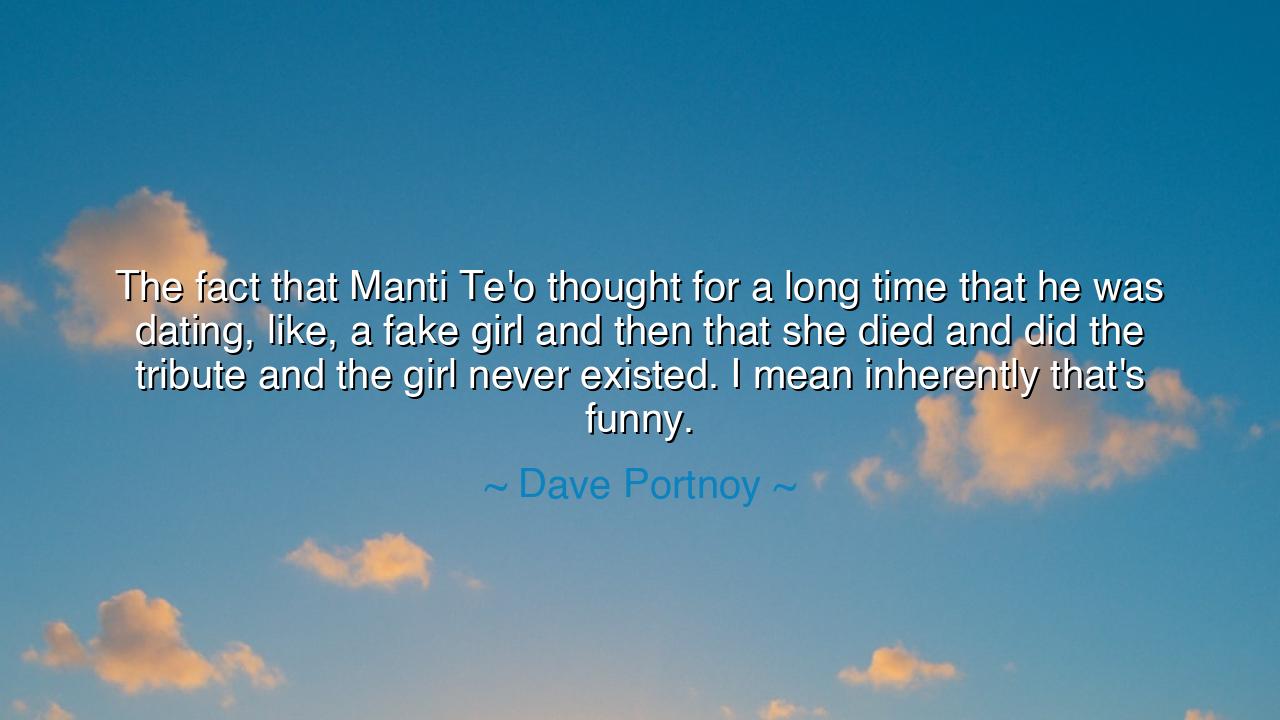
The fact that Manti Te'o thought for a long time that he was
The fact that Manti Te'o thought for a long time that he was dating, like, a fake girl and then that she died and did the tribute and the girl never existed. I mean inherently that's funny.






When Dave Portnoy said, “The fact that Manti Te’o thought for a long time that he was dating, like, a fake girl and then that she died and did the tribute and the girl never existed. I mean inherently that’s funny,” he spoke in jest, yet his words unveil a truth both tragic and revealing. Beneath the laughter lies a mirror to human folly—the tension between illusion and reality, between the sincerity of one heart and the deception of another. His observation, though spoken in the tone of comedy, touches the roots of a very old story: the way in which human beings, longing for love and meaning, sometimes build castles upon sand, mistaking shadows for substance.
The story of Manti Te’o, once a great athlete and hero, unfolds as a modern myth of trust betrayed. In the digital age, where faces flicker across screens and affection is built upon messages rather than presence, he fell deeply in love with an image that never lived. The woman he believed in—the one he mourned, the one whose death inspired his strength on the field—was but a phantom, woven from lies. To the world, it became a spectacle; to him, it was heartbreak. And when Portnoy calls it “inherently funny,” he does not laugh at the pain itself, but at the surreal absurdity of the human condition: that we can love so fiercely what never was, and grieve so deeply for what never lived.
The ancients, too, knew of such tragedies. In the story of Pygmalion, the sculptor fell in love with the statue he himself had carved. He gazed upon the cold marble and saw beauty so vivid that he forgot it was stone. The gods, moved by his longing, brought his creation to life—but not every illusion is granted such mercy. Manti Te’o, like Pygmalion, loved what was not real, yet unlike the sculptor of myth, he was not rewarded, but mocked. The lesson is timeless: our hearts are powerful enough to animate even illusions, and our need to believe in love can blind us to its absence.
Yet Portnoy’s words also reveal the cruel humor of the crowd. Humanity has always laughed at the misfortunes of others, not from malice alone, but because laughter protects us from fear. When we mock the deceived, we distance ourselves from their vulnerability. It is easier to laugh at Te’o’s naivety than to admit that we, too, could be fooled by the warmth of a false voice or the promise of connection. The ancients called this kind of laughter tragic mirth—a way of confronting the uncomfortable truth that none of us are immune to the illusions of the heart.
There is wisdom to be found even in this mockery. Humility teaches us that every human being lives partly in illusion. We craft stories about who we are, what we love, and how the world should be. The difference between Manti Te’o and the rest of us is only that his illusion was exposed to the light, while ours often remain hidden. Portnoy’s remark, though laced with irony, reminds us that humor is sometimes the only language through which we can face the absurdity of life without despair. Laughter can be cruel, but it can also be cleansing—it strips away false sanctity and leaves only what is true: that the human heart is both brave and foolish in equal measure.
From this story, let us learn not only to laugh, but also to understand. The world of digital connection has multiplied the opportunities for illusion; yet, the longing that drives those illusions is ancient. We must meet it not with scorn, but with compassion. To love in good faith, even when deceived, is not shameful—it is human. But we must also walk with awareness, seeking truth before surrender. As the wise have said, “The eyes of love must also be the eyes of discernment.”
So, let this tale stand as both warning and reminder. When Dave Portnoy calls the story “inherently funny,” he holds up a mirror to our age—a time when the line between truth and fiction has thinned to a whisper. Laugh if you must, but let that laughter awaken reflection. Be not ashamed to love, but be vigilant of illusion. For the heart that learns to see clearly will love more deeply, and the soul that understands its own foolishness will walk the earth with compassion instead of cruelty. In this way, what begins as laughter may yet become wisdom, and what began as mockery may end as mercy.






AAdministratorAdministrator
Welcome, honored guests. Please leave a comment, we will respond soon